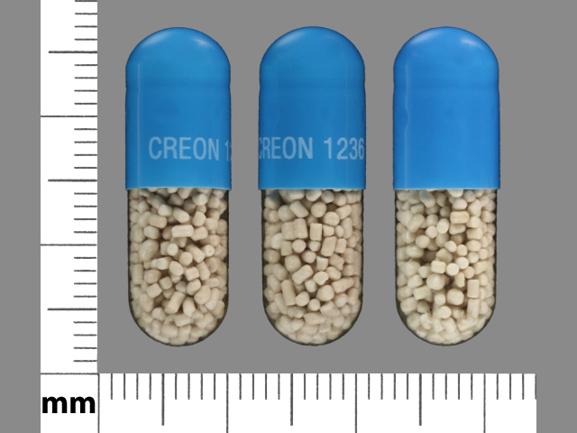Creon Disease Interactions
There is 1 disease interaction with Creon (pancrelipase).
Pancrelipase (applies to Creon) hyperuricemia
Moderate Potential Hazard, Moderate plausibility. Applicable conditions: Gout, Renal Dysfunction
Porcine-derived pancreatic enzyme products contain purines that may increase blood uric acid levels. Extremely high dosages of exogenous pancreatic enzymes have also been associated with hyperuricosuria and hyperuricemia. Therapy with pancrelipase should be administered cautiously in patients with preexisting hyperuricemia, gout, or renal impairment. Monitoring of serum uric acid levels is recommended.
References
- "Product Information. Viokase (pancrelipase)." Wyeth-Ayerst Laboratories PROD (2001):
- "Product Information. Ku-Zyme (pancrelipase)." Schwarz Pharma (2022):
- "Product Information. Zymase (pancrelipase)." Organon PROD (2001):
- "Product Information. Cotazym (pancrelipase)." Organon PROD (2001):
- "Product Information. Cotazym-S (pancrelipase)." Organon PROD (2001):
- "Product Information. Pancrease (pancrelipase)." McNeil Pharmaceutical PROD (2001):
- "Product Information. Pancrease (pancrelipase)." Apothecon Inc (2022):
- "Product Information. Ultrase (pancrelipase)." Scandipharm Inc PROD (2001):
- "Product Information. Ultrase MT 12 (pancrelipase)." Scandipharm Inc PROD
- "Product Information. Creon 5 (pancrelipase)." Solvay Pharmaceuticals Inc PROD (2001):
- "Product Information. Creon 10 (pancrelipase)." Solvay Pharmaceuticals Inc PROD (2001):
- "Product Information. Creon 20 (pancrelipase)." Solvay Pharmaceuticals Inc PROD (2001):
Creon drug interactions
There are 26 drug interactions with Creon (pancrelipase).
Creon alcohol/food interactions
There is 1 alcohol/food interaction with Creon (pancrelipase).
More about Creon (pancrelipase)
- Creon consumer information
- Check interactions
- Compare alternatives
- Pricing & coupons
- Reviews (58)
- Drug images
- Side effects
- Dosage information
- During pregnancy
- Support group
- FDA approval history
- Drug class: digestive enzymes
- Breastfeeding
- En español
Related treatment guides
Drug Interaction Classification
| Highly clinically significant. Avoid combinations; the risk of the interaction outweighs the benefit. | |
| Moderately clinically significant. Usually avoid combinations; use it only under special circumstances. | |
| Minimally clinically significant. Minimize risk; assess risk and consider an alternative drug, take steps to circumvent the interaction risk and/or institute a monitoring plan. | |
| No interaction information available. |
Further information
Always consult your healthcare provider to ensure the information displayed on this page applies to your personal circumstances.


